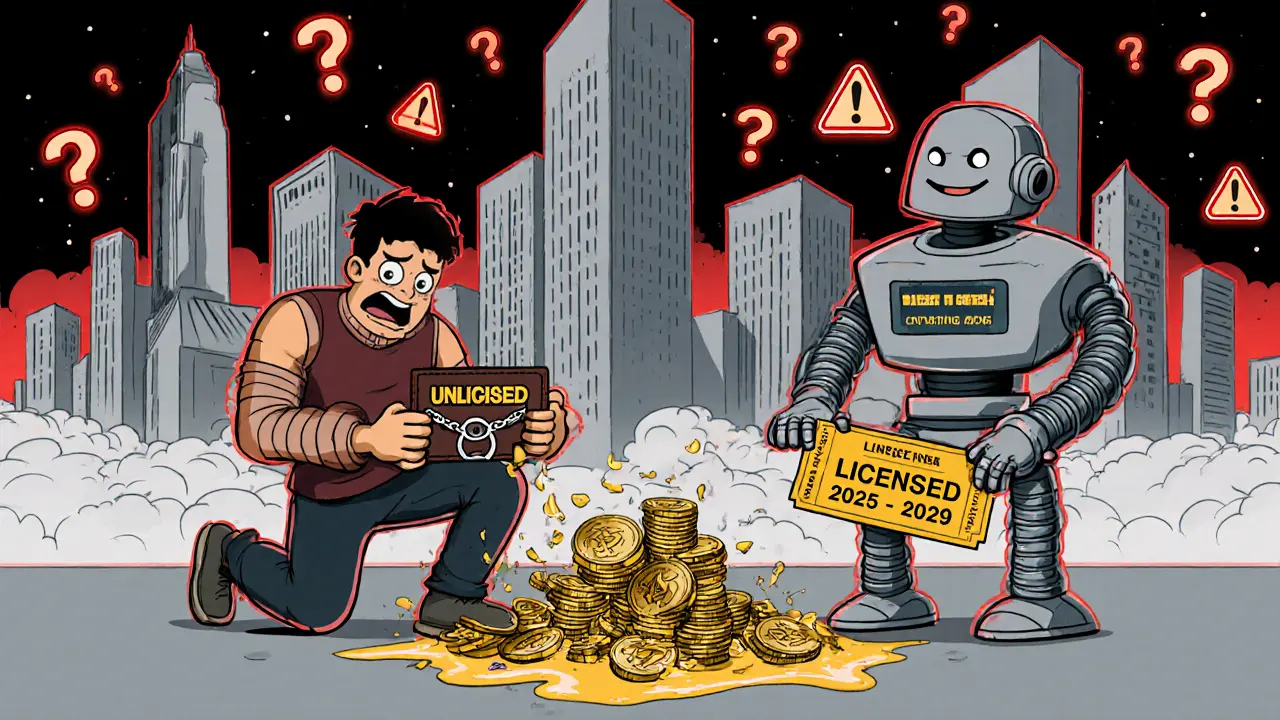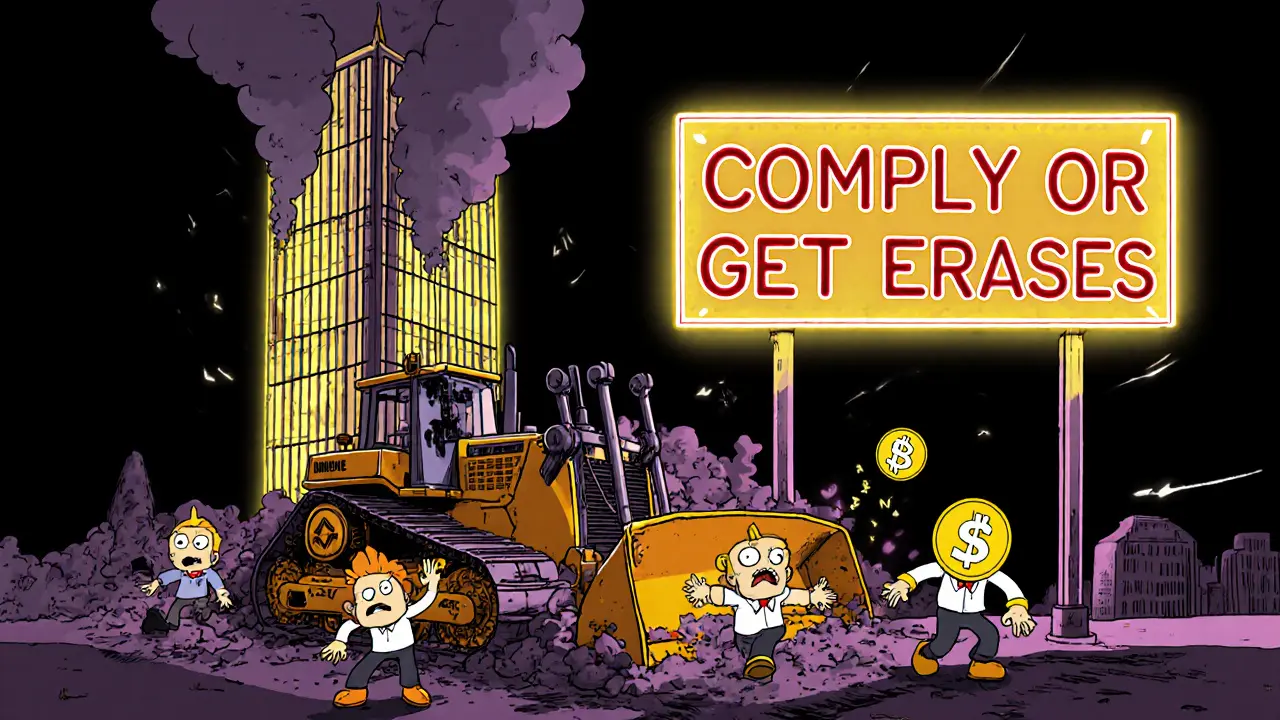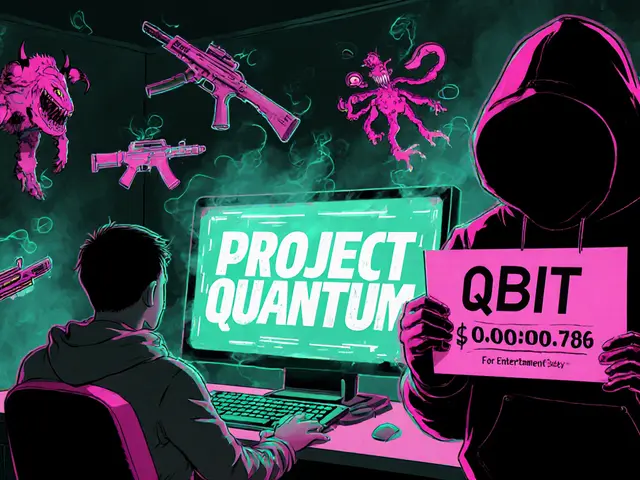Thailand’s Crypto Crackdown Is Real - And It’s Getting Worse
If you’re trading crypto in Thailand or targeting Thai users with a platform, you’re playing with fire. As of April 2025, Thailand’s Securities and Exchange Commission (SEC) has turned up the heat on unlicensed crypto businesses with penalties that can land you in jail, wipe out your assets, or shut you down overnight - no warning, no appeal. This isn’t a warning. It’s already happening.
Five foreign crypto platforms were blocked in June 2025 without a court order. Thousands of Thai users woke up to locked wallets. Some lost access to their funds permanently. The message is clear: if you’re not licensed by the SEC, you’re not allowed to operate in Thailand - and the government has the power to erase your presence from the internet in minutes.
What Happens If You’re Caught Breaking the Rules?
Thailand’s 2025 Royal Decree on Digital Asset Businesses doesn’t just fine you. It punishes you. And it doesn’t care if you’re a small trader or a global exchange.
For individuals using so-called "mule accounts" - crypto wallets or bank accounts that receive money from scams or fraud - the penalty is up to three years in prison and a fine of up to 300,000 THB (about $8,400 USD). You don’t need to be the scammer. If your wallet received stolen funds and you didn’t report it, you’re guilty.
For platform operators, the stakes are even higher. Licensed exchanges now face unlimited liability for fraud that happens on their platforms. If a user gets scammed and transfers funds through your exchange, you might be legally required to pay them back - even if you had no part in the scam. This is like holding a bank responsible for every ATM robbery that happens in its branch. No other country in Southeast Asia has gone this far.
Foreign platforms that ignore the rules don’t just get fined. They get erased. The Ministry of Digital Economy and Society (MDES) can block your website, app, and payment gateways with a single order. No judge. No hearing. Just gone.
Foreign Crypto Platforms: The Localization Trap
If you’re based outside Thailand but want to serve Thai users, you’re not just applying for a license. You’re building a whole new company.
Since January 2025, any crypto platform targeting Thai customers - even if it’s just in Thai language, accepts THB payments, or runs ads on Google Thailand - must:
- Set up a legal entity in Thailand
- Appoint a Thai national as director
- Open a Thai bank account
- Integrate with Thailand’s national AML system
- Pass FATF-compliant transaction monitoring
- Join the SEC’s regulatory sandbox
That’s not a checklist. That’s a full-time corporate restructuring. Legal firms in Bangkok charge between 500,000 and 2,000,000 THB ($14,000-$56,000 USD) just to help you navigate this. Many small exchanges walked away instead.
And it’s not enough to just comply. You have to prove you’re compliant every day. The SEC requires real-time monitoring of all transactions. Suspicious activity? Freeze the account. Wallet linked to fraud? Blacklist it. User reports a scam? You must help refund them - even if you didn’t cause it.

What About Thai Traders? Is It Safer Now?
For Thai users, the answer is yes - but with trade-offs.
Since the crackdown, trading volume on licensed exchanges has jumped 23%. Users report fewer scams, faster fraud response, and better customer support. KYC is brutal now - you need government ID, live selfies, proof of address, and sometimes even a video call. But the trade-off is security.
On the downside, there are now only seven licensed platforms left, down from twelve in January 2025. Fewer choices mean higher fees and less competition. Some traders say they’re paying 20% more in trading fees than they did last year.
And if you’re using an unlicensed platform? You’re on your own. The SEC doesn’t protect you. Your funds aren’t insured. If the platform vanishes, you won’t get your money back - and you might be investigated for using it.
Stablecoins, Taxes, and the Gray Areas
Thailand isn’t banning crypto - it’s controlling it. In March 2025, the SEC approved USDT and USDC for use on licensed exchanges. But here’s the catch: you still can’t use them to pay for coffee, rent, or groceries. Cryptocurrencies are investment assets only - not money.
There’s one bright spot: if you trade on a licensed exchange, you get a five-year tax holiday on capital gains. From January 2025 to December 2029, you pay zero tax on profits. That’s a huge incentive to stay compliant.
But after 2029? No one knows. The government hasn’t said. That uncertainty is making long-term investors nervous. Will taxes jump to 15%? 20%? Will they retroactively audit your past trades? There’s no answer - just a countdown clock.

What’s Next for Thailand’s Crypto Scene?
Thailand isn’t slowing down. The SEC is already looking at DeFi protocols, NFT marketplaces, and crypto lending platforms. If you’re building anything that touches Thai users, you’re already in their crosshairs.
Industry experts predict that within 12 to 18 months, unlicensed crypto activity in Thailand will vanish. The penalties are too high. The risk is too great. The government has the tools to shut you down - and they’re not afraid to use them.
But there’s a hidden cost. By making compliance so expensive and risky, Thailand may be killing innovation. Smaller startups can’t afford the legal fees. International teams won’t risk unlimited liability. The market is becoming a closed club - dominated by a few well-funded players.
And while Thailand leads Southeast Asia in enforcement, other countries are watching. If this model works - fewer scams, more control, higher compliance - expect Indonesia, Vietnam, and the Philippines to follow suit. Thailand isn’t just setting rules. It’s setting the tone for the region.
What Should You Do Right Now?
If you’re a Thai trader: Move your funds to a licensed exchange. Don’t wait. If your current platform isn’t on the SEC’s official list, you’re at risk. Check the SEC Thailand website for the current list of approved platforms. Keep records of all your trades - you’ll need them for tax purposes when the exemption ends.
If you’re a foreign platform operator: Stop assuming you can ignore Thailand. If you have Thai users, even a few, you’re already in scope. Talk to a Thai legal firm. Start the licensing process now. It takes 6-12 months. Delaying means losing your market.
If you’re a developer or investor: Be careful. Thailand’s crypto market is no longer a free zone. It’s a high-security, high-risk environment. Only move money or build products if you’re ready for full compliance - or if you’re ready to walk away.
There’s no middle ground anymore. In Thailand, crypto is either licensed - or illegal.
Can I still use Binance or KuCoin in Thailand?
No. Binance, KuCoin, Bybit, and other unlicensed platforms were blocked in June 2025. Thai users can no longer access them. If you try to log in, you’ll get an error. Any funds still on these platforms after the deadline are at risk of being frozen permanently. The SEC advises users to withdraw funds before the cutoff - but many didn’t make it in time.
What happens if I used an unlicensed platform before the ban?
Just using an unlicensed platform isn’t illegal - but it’s risky. You won’t be jailed for trading. However, if you received funds from a scam through that platform, you could be investigated for money laundering. The SEC may ask you to prove the source of your crypto. If you can’t, you could face fines or asset freezes. Keep all transaction records.
Is crypto taxed in Thailand after 2029?
It’s unknown. The five-year capital gains tax exemption ends on December 31, 2029. The government has not announced what will come next. Many experts expect a 15-20% tax on profits, but this is speculation. Traders should assume taxes will return and plan accordingly.
Can I start a crypto business in Thailand as a foreigner?
Yes - but only if you set up a Thai company, hire a Thai director, open a Thai bank account, and get licensed by the SEC. The process takes 6-12 months and costs at least $20,000 USD in legal and compliance fees. Most foreign startups avoid it. Only large, well-funded firms have the resources to comply.
Are stablecoins like USDT legal in Thailand?
Yes - but only on licensed exchanges. You can buy, sell, and hold USDT and USDC. But you cannot use them to pay for goods or services. They are treated as investment assets, not currency. The SEC is monitoring their use closely and may add more restrictions later.
What’s the difference between SEC and MDES in Thailand’s crypto rules?
The SEC handles licensing, compliance, and financial oversight of crypto exchanges. The MDES handles enforcement - including blocking websites, shutting down apps, and investigating cybercrime. If you’re a platform, you deal with the SEC for paperwork. If you’re a user, you deal with the MDES if your platform gets blocked.






Brian Gillespie
Just moved my funds to Bitkub. Better late than never.